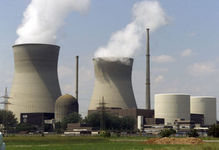
The German government says that this decision advances four priorities: Germany's standing as a top global economy, an affordable and sufficient energy supply, climate protection, and independence from energy imports. It appears, however, that the real impetus for the decision was political. Large portions of the German public wanted to abandon nuclear power after Chernobyl, as Italy did, and the latest nuclear disaster in Japan pushed public opinion over the brink.
The big question is: How will the fourth largest economy in the world meet its power needs without nuclear power plants?
Nuclear power supplies 23% of Germany's electricity today. Even assuming zero growth in demand for electricity over the next 10 years, replacing almost a quarter of the German electricity supply will not be easy . . . or cheap. Renewables such as solar and wind supply only 17% of German electricity today, and that has been achieved only with extensive and expensive government subsidies. Replacing nuclear power with renewables will require not only more investments in renewable generation, but also investments in a smarter grid and storage to match these intermittent sources with demand.
Keep in mind that tripling the amount of electricity generated from renewable sources over the next 10 years will only replace the electricity lost from nuclear plants. It will do nothing to reduce the 60% of electricity that now comes from coal, natural gas, and other fossil fuels. And if Germany is unsuccessful in replacing nuclear with renewables, it will be forced to replace nuclear with dirty fossil fuels.
Proponents of shutting down the nuclear power plants say that Germany can do it all. They claim that greater efficiencies will not only stop the growth of electricity consumption, but will actually reduce consumption by 10% over the next 10 years. They claim that new investments in renewable generation, storage, and a smarter grid will create jobs and make Germany a world leader in important new industries. And that a decade from now, Germany will have a competitive advantage because half or more of its electricity will come from renewable sources that have zero ongoing fuel costs.
I hope they succeed.
John Howley
Woodbridge, New Jersey

 RSS Feed
RSS Feed